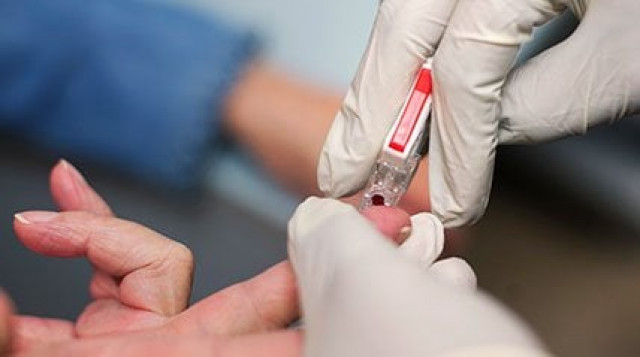Blood Donor Day: Over 2,000 people tested positive for hepatitis at Polyclinic
Health officials say there is a need to promote volunteer blood donating culture

The alarming figures were revealed during a seminar to mark blood donors’ day at the hospital. PHOTO: REUTERS
The alarming figures were revealed during a seminar to mark blood donors’ day at the hospital on Saturday, organised by the Federal Government Poly Clinic (FGPC) to encourage a culture of volunteer blood donation in the country.
Presenting an annual report yearly report, Polyclinic Blood Bank In-charge Dr Sharif Astori said that between June 2016 to May 2017, they had checked blood groups of 58,914 people.
More hepatitis filter clinics will be established across province: CM
Of these, he said, 29457 people were tested for hepatitis and 684 were found positive for hepatitis B. A further 2,059 were found positive for hepatitis C, an alarming figure.
Detailing the process of blood screening, he said that a blood bag costs around Rs4,000. But the hospital donates the blood and does all tests for free. In a year, he said, the hospital provides 6,868 blood bags to thalassemia patients for free.
Talking about blood donation, Dr Astori said there was a need to make the people aware about blood donations as part of advanced preparations for any disaster. “We are fighting a war on terror and must be prepared for any emergency,” he said.
Every year, on June 14, he said countries around the world celebrate World Blood Donor Day (WBDD) to raise awareness about the need for safe blood and blood products.
One-week hepatitis drive kicks off
Meanwhile, addressing a seminar on the National Coordinator Safe Blood Transfusion Programme (SBTP), Dr Hassan Abbas Zaheer said that the Safe Blood Transfusion Programme had been established to create a high-visibility environment to promote a modern, national blood transfusion system as part of its health services.
He said that the SBTP has continued to scale up visibility through a series of strategies and training workshops on all aspects of blood safety. He said that since its establishment in 2010, the SBTP has been able to significantly contribute to the improvement in blood safety standards and establish strong bonds among national stakeholders.
Published in The Express Tribune, June 11th, 2017.



















COMMENTS
Comments are moderated and generally will be posted if they are on-topic and not abusive.
For more information, please see our Comments FAQ